
We’re only hours away from finding out who will take home the 2017 National Book Awards. Each one of the five fiction and non fiction titles below has received the much-coveted silver sticker from this year’s panel of judges, but who will emerge with the gold? Who will join such luminaries as William Faulkner, Ralph Ellison, Flannery O’Connor, Joan Didion, and Ta-Nehesi Coates in the Pantheon of the (American literary) Gods?
We just don’t know yet.
But we do know what the critics wrote about each book at the time of its release earlier this year. And now, so do you.
*
Fiction

Dark at the Crossing by Elliot Ackerman (Knopf)
(3 Positive, 2 Mixed)
“As a journalist reporting on the war in Syria since 2013, Ackerman’s eye for detail grounds this novel in a space that quickly transports readers into a world few Americans know … The novel starts slowly over the first few mini-chapters, as if the author’s pen needed to knock off a bit of rust from its undercarriage. And there are a couple of instances when Ackerman doesn’t trust the reader enough, but overall, the writing is multivalent and propels us forward … Dark at the Crossing is not only a fictional meditation on remorse, betrayal, love and loss, but also a journey that returns us to the beautiful and broken world we live in.”
–Brian Turner (The Washington Post)
Read an excerpt from Dark at the Crossing here
*
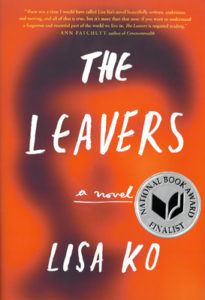
The Leavers by Lisa Ko (Algonquin Books)
(4 Rave, 4 Positive, 5 Mixed)
“…[an] achingly insightful, gorgeously redemptive debut … Although Ko began writing Leavers in 2009, headlines regarding immigrants have hardly changed: round-ups, detention, deportation, separated families – especially tragic are recent international adoptees deported as adults because of legal loopholes to a birth country they left as children . Beyond the desensitizing media coverage, Ko gives faces, (multiple) names, and details to create a riveting story of a remarkable family coming, going, leaving…all in hopes of someday returning to one another.”
–Terry Hong (The Christian Science Monitor)
Read an essay by Lisa Ko here
*
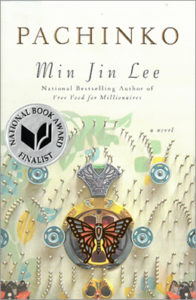
Pachinko by Min Jin Lee (Grand Central Publishing)
(6 Rave, 1 Positive)
“…[a] stunning novel … Like most memorable novels, Pachinko resists summary. In this sprawling book, history itself is a character. Pachinko is about outsiders, minorities and the politically disenfranchised. But it is so much more besides … Despite the compelling sweep of time and history, it is the characters and their tumultuous lives that propel the narrative. Small details subtly reveal the characters’ secret selves and build to powerful moments … The numerous shifts are occasionally jolting, but what is gained is a compassionate, clear gaze at the chaotic landscape of life itself. In this haunting epic tale, no one story seems too minor to be briefly illuminated.”
–Krys Lee (The New York Times Book Review)
Read an excerpt from Pachinko here
*
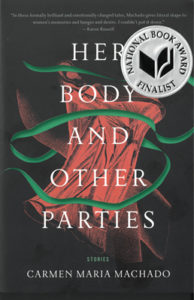
Her Body and Other Parties by Carmen Maria Machado (Graywolf Press)
(14 Rave, 3 Positive)
“Written in prose so textured that you want to rub her phrases between your fingertips … A muscular strain of feminism runs through this book, whose contemplation of the female body is bound up in sex, power, pleasure, pain, and the fitful struggle against self-loathing. Rarely is a writer as skilled as Machado at evoking corporeality: the myriad sensations of inhabiting flesh and bone, with all its messiness and ecstasies. Sex plays a major part in these stories, and she excels at potent depictions that sidestep the ick factor so many authors find difficult to avoid … This is what she does best, and she does it again and again in this collection: blend disparate, jostling elements to achieve a ferocious alchemy.”
–Laura Collins-Hughes (The Boston Globe)
Read an excerpt from Her Body and Other Parties here
*

Sing, Unburied, Sing by Jesmyn Ward (Scribner)
(19 Rave, 6 Positive, 2 Mixed)
“As long as America has novelists such as Jesmyn Ward, it will not lose its soul … Sing, Unburied, Sing is nothing short of magnificent. Combining stark circumstances with magical realism, it illuminates America’s love-hate tug between the races in a way that we seem incapable of doing anywhere else but in occasional blessed works of art. But first, it tells a great story … The book’s title could be read two ways — as an ode to the haunting music of the undead, whose histories shape our own, or as an exhortation to those still living to stand tall and proud against every form of bondage … This novel is her best yet. Her voice is calm, wise, powerful. Politics and outrage are wholly absent from Sing, and yet it beautifully illuminates the issues that wrack our nation through the story of one American family that we finally recognize as — us.”
–Pamela Miller (The Minneapolis Star Tribune)
Read an excerpt from Sing, Unburied, Sing here
**
Non Fiction
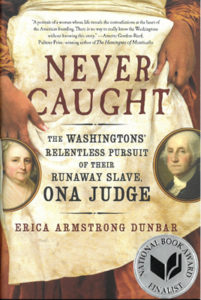
Never Caught by Erica Armstrong Dunbar (Atria)
(1 Rave, 2 Positive)
“If there’s an irony to the fact that February, Black History Month, also contains Presidents’ Day, Erica Armstrong Dunbar’s new book brings that irony into sharp relief. Never Caught is a chronicle that throws considerable shade on America’s Founding Fathers for their slaveholding hypocrisy … Even for those who know the basics, Never Caught is a crisp and compulsively readable feat of research and storytelling.”
–Matt Damsker (USA Today)
Read an interview with Erica Armstrong Dunbar here
*

The Evangelicals by Frances FitzGerald (Simon & Schuster)
(3 Rave, 4 Positive, 2 Mixed, 1 Pan)
“Her book makes the case so well, it leaves readers with the feeling that we should all be paying closer attention … Although FitzGerald’s coda on Donald Trump’s victory has a tacked-on feel in an otherwise masterful narrative, her explanation of evangelical support for his campaign — which puzzled many — reads as essential. FitzGerald illuminates how a decades-long relationship between the Christian right and the Republican Party (later joined by the Tea Party) coalesced into what looks like a mutually inextricable bloc.”
–Lily Rothman (TIME)
Read an interview with Frances FitzGerald here
*
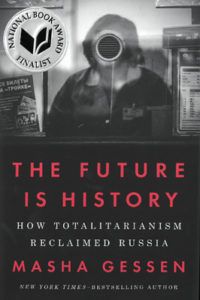
The Future is History by Masha Gessen (Riverhead Books)
(9 Rave, 4 Positive, 2 Mixed)
“…a magisterial, panoramic overview of Russia under Putin … While the people she singles out are often vociferous opponents of the rearward direction of the New Russia, she gives at least equal time to the group the perestroika historian Yuri Afanasyev dubbed ‘the aggressively obedient majority’ and to the tens of millions of ordinary Russians who would be happy to go back to the USSR, more or less … The characters’ personal histories add life and nuance to Gessen’s narrative. But it takes a while to get a handle on all of the players, who are as numerous as the cast of a Tolstoy novel, if less romantically clad. But portraying the politics of totalitarianism does not call for a romantic filter. Gessen’s reconstruction of the ongoing saga of Russia’s reversion to vozhdizm makes for thrilling and necessary reading for those who seek to understand the path to suppression of individual freedoms, and who recognize that this path can be imposed on any nation that lacks the vigilance to avert it.”
–Liesl Schillinger (The Barnes & Noble Review)
Read an essay by Masha Gessen here
*
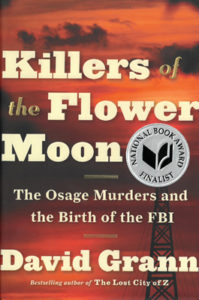
Killers of the Flower Moon by David Grann (Doubleday)
(18 Rave, 4 Positive, 1 Mixed)
“…the strangest, most horrific story that Grann has told … Grann folds it, neatly, into three hundred pages. But he also makes something much more out of the material—something deep, devastating, and almost unbearably sad. On the one hand, he takes in the entirety of what was done to the Osage and, by extension, to the American Indian. On the other, he paints intimate portraits of men and women who’d murder their husbands, their wives, their own children … What we’re left with are circles of complicity that widen and widen until, terrifyingly, they grow to encompass the reader as well.”
–Alex Abramovich (Bookforum)
Read an interview with David Grann here
*

Democracy in Chains by Nancy MacLean (Viking)
(4 Rave, 5 Positive)
“Her book includes familiar villains—principally the Koch brothers—and devotes many pages to think tanks like the Cato Institute and the Heritage Foundation, whose ideological programs are hardly a secret. But what sets Democracy in Chains apart is that it begins in the South, and emphasizes a genuinely original and very influential political thinker … MacLean’s undisguised loathing of him and others she writes about will offend some readers. But that same intensity of feeling has inspired her to untangle important threads in American history—and to make us see how much of that history begins, and still lives, in the South.”
–Sam Tanenhaus (The Atlantic)
Read an interview with Nancy MacLean here
***
Check out Lit Hub’s ‘Meet the National Book Awards Finalist’ interview series here

